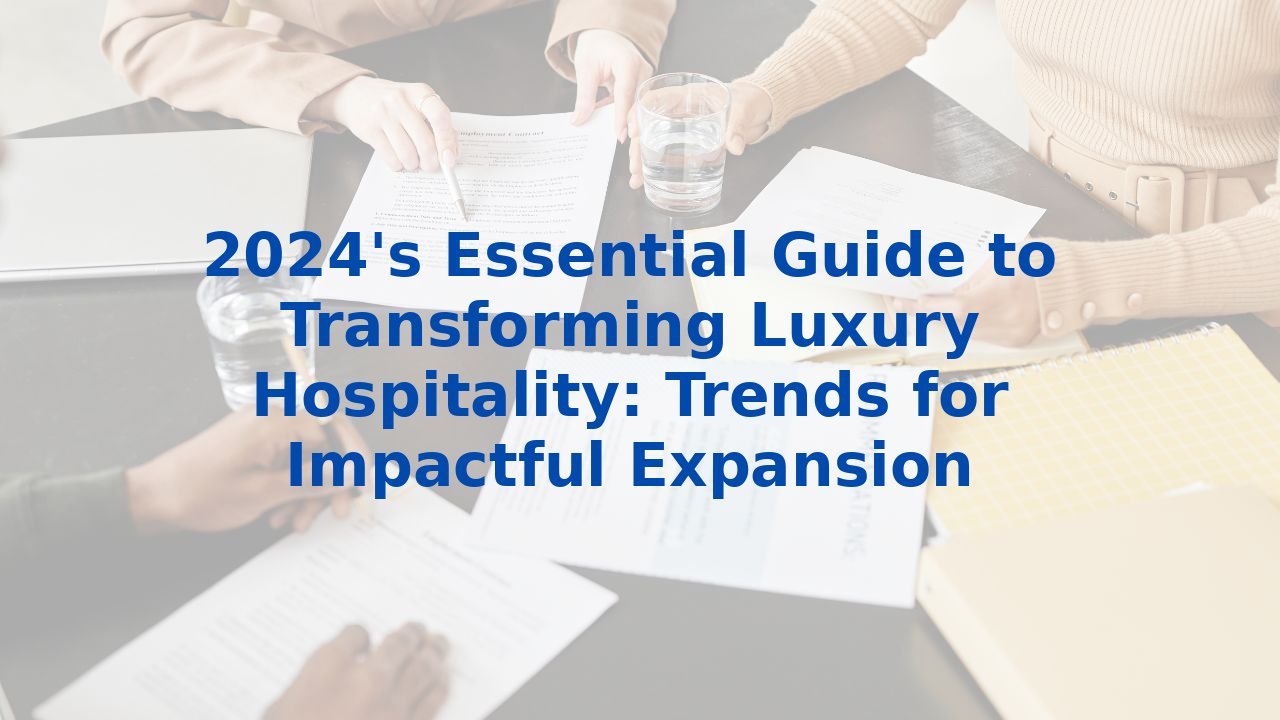2024's Essential Guide to Transforming Luxury Hospitality: Trends for Impactful Expansion
2024's Essential Guide to Transforming Luxury Hospitality: Trends for Impactful Expansion
The luxury hospitality industry stands at a transformative crossroads in 2024. With changing consumer preferences, the rapid evolution of technology, and an increasing emphasis on sustainability, the landscape is ripe for reinvention. This guide explores the critical trends that luxury property owners can harness to optimize their assets, enhance guest experiences, and create impactful expansion strategies.
Transforming Underused Spaces into High-Revenue Assets
One of the more exciting avenues of growth in luxury hospitality lies in transforming underused spaces into high-revenue assets. Instead of underestimating a lobby's potential, luxury properties are reimagining them as vibrant social hubs, complete with personalized services that immerse guests in unique cultural experiences. By creatively designing these spaces, hotels can not only enhance guest engagement but also unlock hidden revenue streams.
Integrating Sustainable Practices
In a world increasingly focused on sustainability, luxury hospitality must adopt eco-friendly practices to meet consumer expectations. Hotels are now prioritizing evidence of responsible corporate citizenship. Incorporating sustainability into business models—through energy-efficient systems, sustainable materials, and waste reduction initiatives—demonstrates commitment and attracts conscientious travelers. This philosophy establishes a sense of brand loyalty that can significantly elevate a hotel's standing in the marketplace.
Leveraging Data-Driven Growth Strategies
Data analytics is rapidly transforming the luxury hospitality landscape. By delving into guest data, hotels can tailor experiences for individuals, optimize room allocations, and streamline operations. Utilizing technology for micro-segmentation allows for the personalization of every guest interaction—think eliminating traditional check-in times or adjusting room atmospheres to preferences.
Leveraging predictive analytics transforms how a hotel understands and anticipates guest behavior, adding another layer of personalization and efficiency. Empowering staff with intelligent insights derived from data allows them to provide tailored services that lead to memorable guest experiences.
Enhancing Guest Experiences
As we step further into 2024, luxury travelers are on the hunt for unforgettable, experiential moments during their stays. Hotels are responding by incorporating local artistry and authenticity into their offerings, creating dynamic programming, and indulging guests in indigenous cuisine. Collaborations with high-end brands, such as luxury rental services for watches or handbags, enhance the experience while reinforcing the essence of luxury.
Benefits of AI in Luxury Hospitality
Artificial Intelligence (AI) is at the forefront of revolutionizing the luxury hospitality sector, paving the way for streamlined operations and heightened personalization. Here are several transformative impacts that AI offers:
- Personalization: AI analyzes guest data to create tailored experiences, such as personalized room settings and dining options that cater to individual preferences.
- Operational Efficiency: Automating routine tasks—like check-ins and check-outs—frees staff to engage more genuinely with guests, enhancing service quality.
- Enhanced Guest Engagement: Employing AI-powered chatbots and virtual assistants facilitates real-time communication, ensuring guests have access to immediate assistance.
- Predictive Analytics: By accurately predicting guest behavior, hotels can anticipate needs and provide even higher levels of service.
Training Employees for AI
To fully capitalize on the innovations AI presents, training employees in its application is paramount. Equipping staff with skills in data analysis, AI-driven decision-making, and customer interaction via AI tools is critical for ensuring seamless integration. As staff become adept in these new technologies, the benefits extend throughout the organization: enhanced efficiency, elevated guest satisfaction, and a significant competitive edge in the marketplace.
Conclusion
The luxury hospitality sector is on the brink of substantial growth in 2024. With transformational changes driven by technology, sustainability, and evolving consumer expectations, property owners must prioritize innovative strategies. By transforming underutilized spaces, adopting sustainable practices, leveraging data analytics, enhancing guest experiences, and embracing AI, luxury hospitality can unlock unprecedented growth opportunities. Moreover, investing in the training and education of employees regarding AI integration solidifies this transformational journey, ensuring lasting impact and success in the industry.
As luxury hospitality continues to adapt and redefine itself, the future is optimistic and filled with possibilities.



